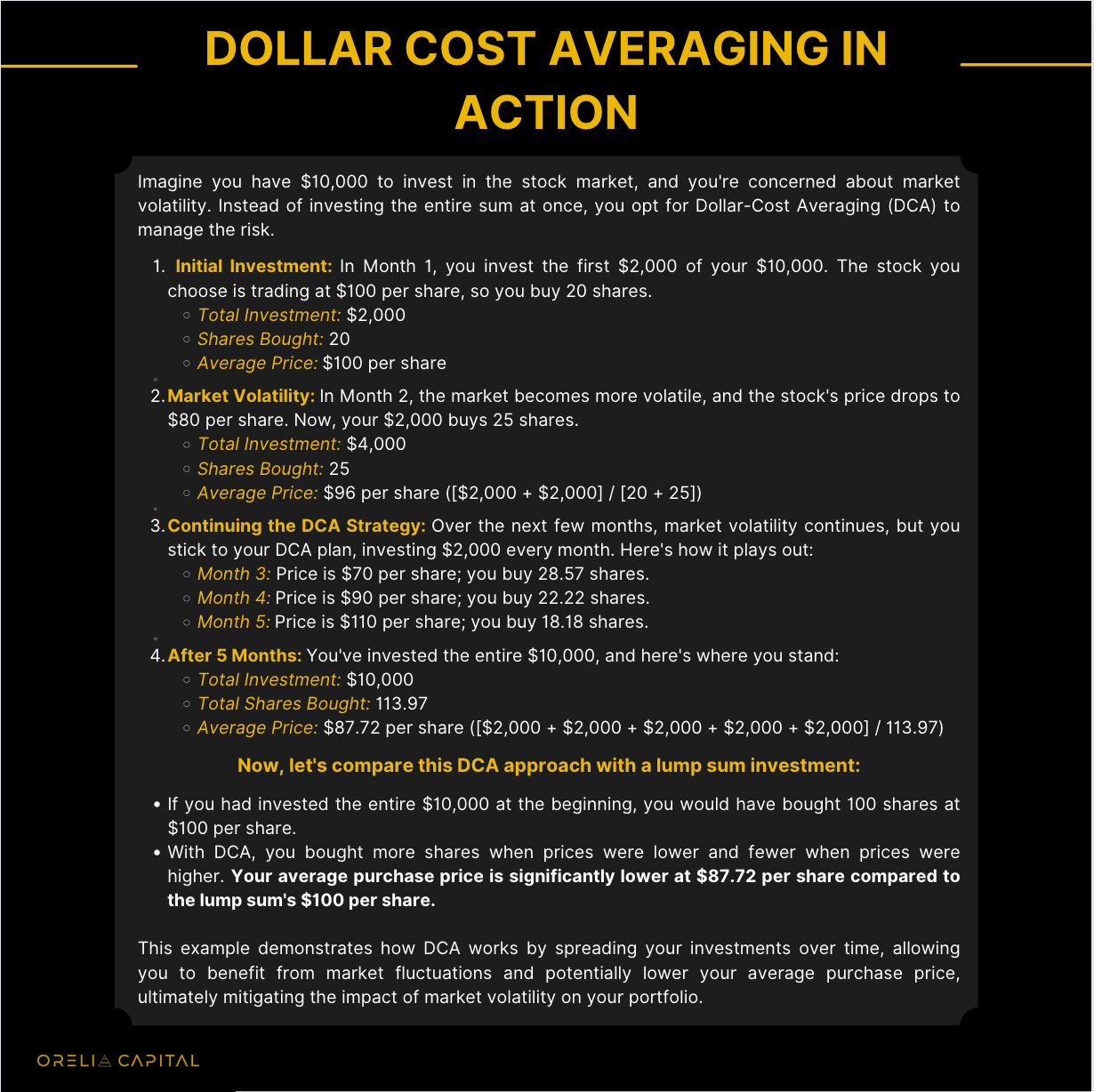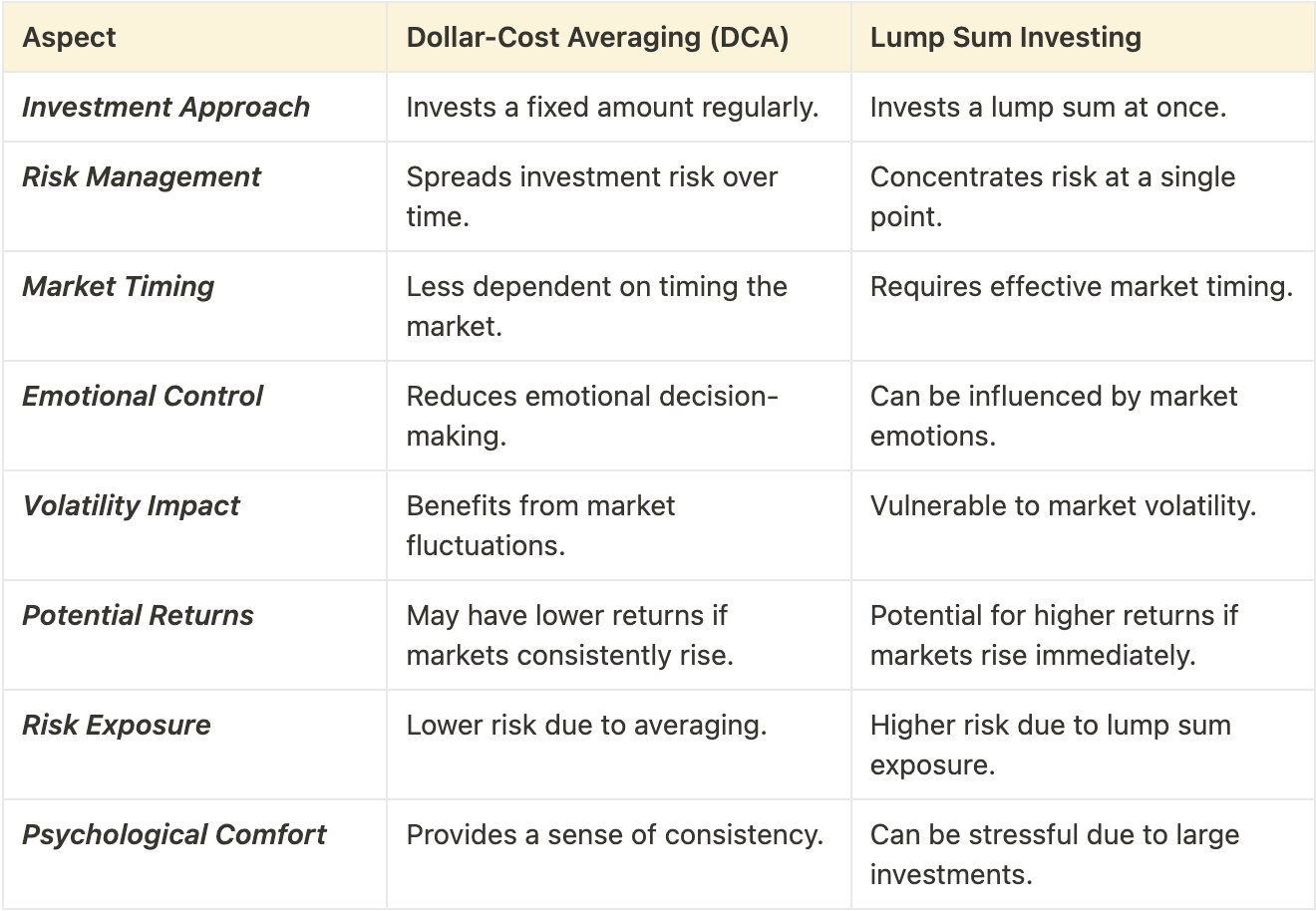Dollar-Cost Averaging: Your Shield Against Market Volatility

Introduction to Dollar-Cost Averaging (DCA)
- Core Concept: DCA is an investment strategy where you consistently invest a fixed amount of money regularly, regardless of market conditions.
- Risk Spreading: The core principle of DCA is to spread risk and avoid the need to time the market perfectly.
- Consistent Investing: With DCA, you commit to investing the same dollar amount on a schedule (e.g., monthly or quarterly), promoting consistency.
- Market Neutrality: DCA doesn't rely on predicting market highs or lows, making it a market-neutral strategy.
- Average Purchase Price: It aims to buy more shares when prices are low and fewer when prices are high, potentially lowering your average purchase price.
- Risk Reduction: DCA is valued for its ability to reduce the impact of market volatility and prevent emotional decision-making.
- Asset Versatility: This strategy can be applied to various asset classes and is especially suitable for long-term investors.
Understanding Market Volatility
Definition: Market volatility refers to the degree of variation in the price of an asset over time. It measures how much and how quickly prices can change.
Causes of Volatility: Market volatility can be triggered by various factors, including economic data releases, geopolitical events, corporate earnings reports, and unexpected news.
Types of Volatility: There are two primary types of market volatility:
- Historical Volatility: This assesses how much an asset's price has fluctuated, providing insights into its past stability.
- Implied Volatility: This reflects market expectations of future price fluctuations and is often used in options pricing.
Why It Matters: Market volatility matters to investors for several reasons:
- Risk Assessment: High volatility suggests higher risk and potential for significant losses.
- Investor Behavior: It can lead to emotional decision-making, like panic selling during market downturns or buying frenzies during rallies.
- Portfolio Impact: Volatility can substantially impact the overall value of investment portfolios.
Volatility vs. Risk: Volatility and risk are related but not the same. Volatility measures price fluctuations, while risk considers the potential for permanent capital loss. Not all volatility indicates high risk.
Understanding market volatility is crucial for investors to make informed decisions, especially when implementing strategies like dollar-cost averaging to mitigate the effects of these market fluctuations.

Benefits of DCA in Volatile Markets
- Emotional Control: DCA reduces impulsive decisions by sticking to a planned schedule, mitigating the emotional rollercoaster of volatile markets.
- Risk Reduction: Spreading investments over time minimizes the impact of market downturns, as you buy more when prices are low and less when they're high.
- Steady Asset Accumulation: DCA ensures consistent asset accumulation, making it ideal for long-term goals like retirement.
- Peace of Mind: A well-thought-out plan lets you worry less about market fluctuations, focusing on your long-term objectives.
- Alignment with Wise Investing: DCA aligns with Warren Buffett's wisdom: "Be fearful when others are greedy and greedy when others are fearful," by buying strategically in different market conditions.
Dollar-Cost Averaging vs. Lump Sum Investing

Tips for Implementing DCA Effectively
Asset Selection:
- Diversify wisely: Spread your investments across a mix of assets like stocks, bonds, and mutual funds to reduce risk.
- Assess your risk tolerance: Align your portfolio with your risk appetite, considering age, financial goals, and time horizon.
Set a Schedule:
- Consistency is key: Determine a regular investment schedule that suits your financial situation (e.g., monthly or quarterly).
- Automate contributions: Set up automatic transfers from your bank account to your investment account to ensure you don't miss contributions.
Stay Informed, but Don't React Emotionally:
- Monitor your investments: Keep an eye on your portfolio's performance, but avoid making impulsive decisions based on short-term market fluctuations.
- Focus on the long-term: Remember that DCA is a strategy designed to work over an extended period; short-term fluctuations are expected.
Emergency Fund:
- Build a safety net: Ensure you have an emergency fund to cover unexpected expenses. This prevents the need to dip into your investments prematurely.
Keep Costs Low:
- Minimize fees: Choose low-cost investment options, such as index funds or ETFs, to maximize your returns over time.
- Tax efficiency: Be mindful of the tax implications of your investments and consider tax-advantaged accounts like IRAs and 401(k)s.
Maintain a Long-Term Perspective:
- Patience pays off: Understand that DCA is a long-term strategy to achieve your financial goals over time.
- Avoid reacting to short-term market noise: Stay focused on your objectives and resist making hasty decisions based on headlines or market hysteria.
Educate Yourself:
- Continuous learning: Stay informed about financial markets, investment strategies, and economic trends.
- Seek professional advice: Consult a financial advisor for personalized guidance and investment recommendations.
In a world where market uncertainty prevails, dollar-cost averaging is a reliable strategy to navigate the ups and downs. By adhering to this disciplined approach, investors can smoothen their ride through turbulent times, all while maintaining control over their financial future. Remember, consistency and patience are your allies in this journey.

We hope you enjoyed this edition of our newsletter. If you found it helpful, please consider sharing it with others who might benefit from this information.
At Orelia Capital, we believe that feedback is a gift. Your feedback can help us improve our content and provide more value to our readers.





